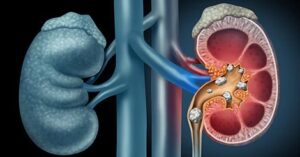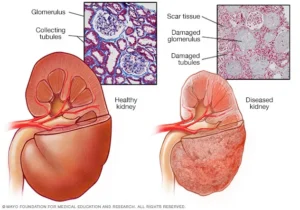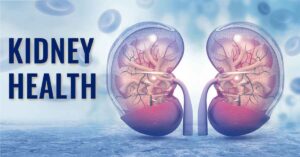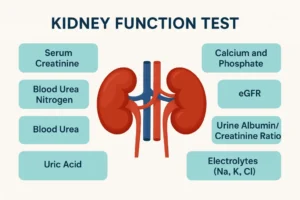Kidney Function Tests Explained: Creatinine, GFR & Results
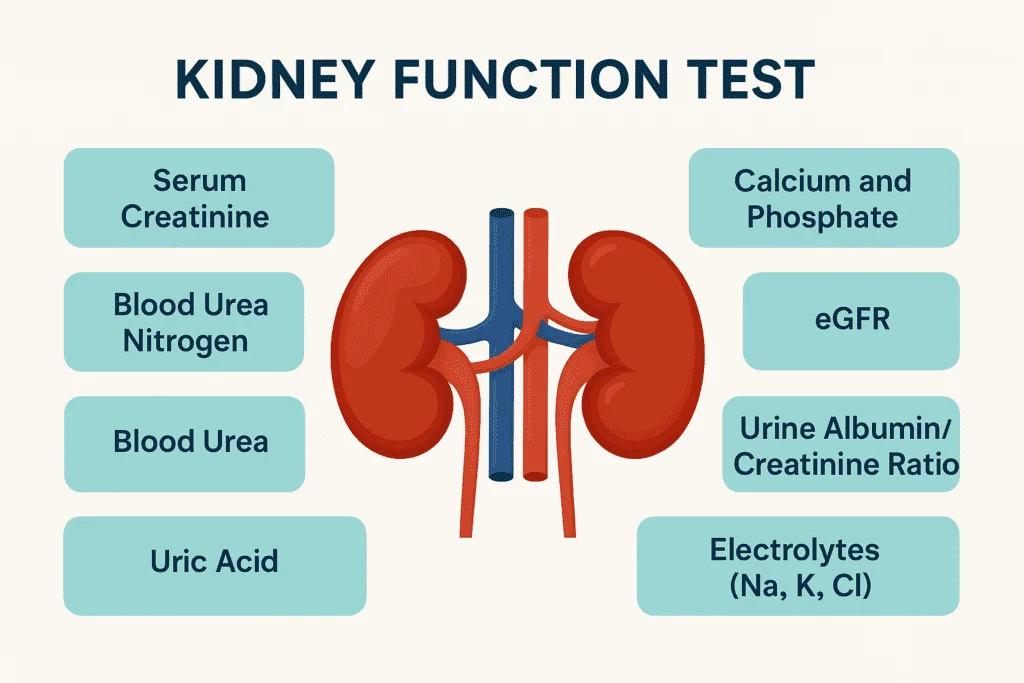
Kidney function tests measure how efficiently your kidneys filter waste and regulate body balance. The main indicators creatinine and GFR (glomerular filtration rate) help detect kidney disease early, monitor progression, and guide treatment decisions.
Key Takeaways
- Creatinine reflects muscle metabolism and filtration efficiency; persistent elevation often signals kidney impairment.
- GFR indicates overall kidney performance; values below 60 mL/min for 3+ months suggest chronic kidney disease.
- Other tests like BUN, ACR, and urinalysis give supporting evidence of filtration and damage.
- Hydration, diet, medications, and lab variations can affect results, so consistent testing conditions are vital.
- Maintaining hydration, limiting salt and protein, managing blood pressure and diabetes, and avoiding unnecessary drugs help preserve kidney function.
- Regular testing ensures early detection, especially for people with diabetes, hypertension, or family history of kidney disease.
How does the Kidney Function?
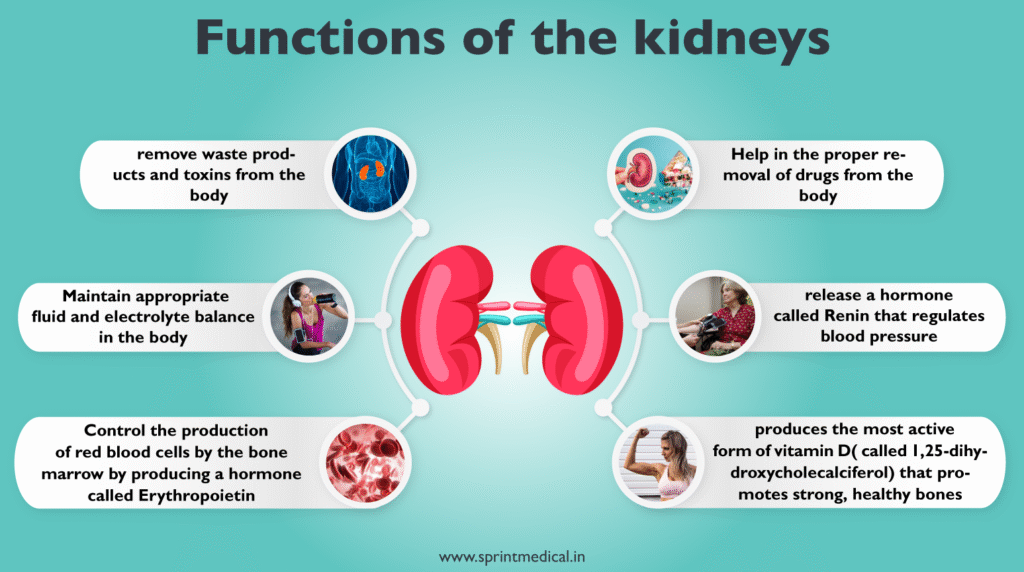
The kidneys are two bean-shaped organs located below the rib cage. Their main job is to filter blood, remove waste, and regulate fluid, electrolytes, and blood pressure. Every day, the kidneys filter about 150-180 liters of blood, keeping useful substances and sending waste out through urine.
When the kidneys are damaged or not working properly, waste such as urea and creatinine builds up in the blood. Regular kidney function tests can detect early changes before symptoms appear.
What is Creatinine?
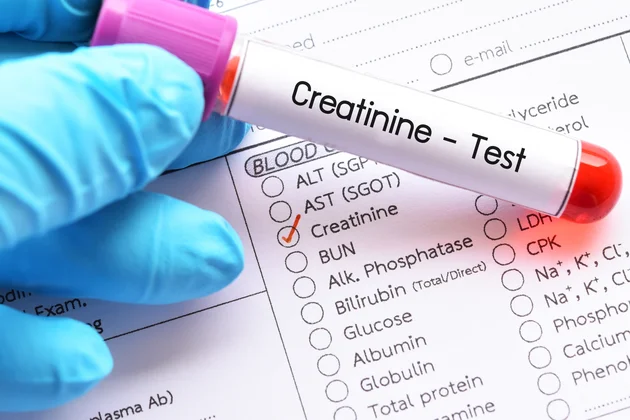
Creatinine is a natural waste product formed by the normal breakdown of muscle tissue. It is released into the bloodstream and filtered out by the kidneys. Because creatinine is produced at a fairly constant rate, its level in the blood is a useful indicator of kidney function.
Normal Creatinine Levels
Creatinine levels can vary depending on age, gender, and muscle mass.
Typical normal values are:
- Men: 0.7 to 1.3 mg/dL
- Women: 0.6 to 1.1 mg/dL
- Children: 0.3 to 0.7 mg/dL
Athletes and muscular individuals may have slightly higher levels without kidney problems, while older adults may have lower levels due to reduced muscle mass.
Why Creatinine Levels Rise
High creatinine in the blood usually means the kidneys are not filtering properly. Common causes include.
- Dehydration or low fluid intake
- Kidney disease or injury
- Obstruction in the urinary tract
- Certain medications that affect filtration
- High-protein diets or excessive muscle activity
A temporary rise can happen after heavy exercise or dehydration, but persistently high levels require medical evaluation.
Limitations of Creatinine Alone
Creatinine levels can be affected by muscle size, diet, and age, so they do not always show the full picture. This is why doctors use GFR (glomerular filtration rate) along with creatinine for better accuracy.
What is GFR (Glomerular Filtration Rate)?
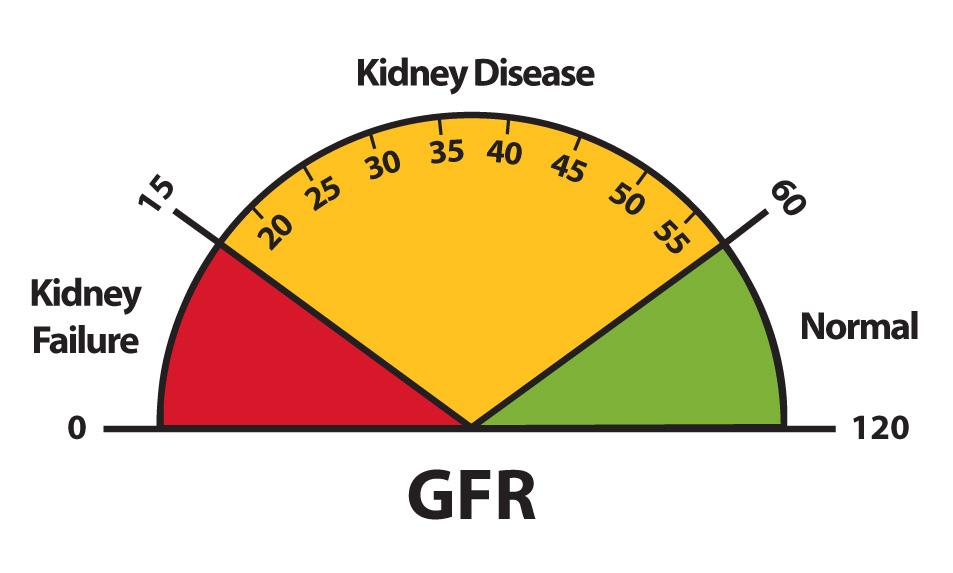
The GFR tells how much blood your kidneys filter per minute. It gives a clearer idea of overall kidney performance. The higher the GFR, the better your kidneys are working.
Doctors often use an estimated GFR (eGFR), which is calculated using a formula that includes your age, gender, race, and blood creatinine level.
Normal GFR Values
The glomerular filtration rate (GFR) shows how well your kidneys filter waste from the blood each minute. Knowing your GFR helps doctors determine how efficiently your kidneys are working and identify early signs of kidney disease.
- Normal kidney function: 90 mL/min or higher
- Mild decrease: 60–89 mL/min
- Moderate decrease: 30–59 mL/min
- Severe decrease: 15–29 mL/min
- Kidney failure: below 15 mL/min
A declining GFR may signal early kidney disease, even when creatinine is only slightly raised.
Why GFR Is Important
GFR is considered the gold standard for evaluating kidney performance. It helps to:
- Detect early kidney damage
- Classify the stage of kidney disease
- Monitor progression or response to treatment
- Adjust medication doses for people with kidney issues
Other Kidney Function Tests
Doctors often order a set of kidney function tests together to get a complete picture of how the kidneys are working. Each test provides different insights into how effectively the kidneys filter blood, remove waste, and maintain balance in the body.
1. Blood Urea Nitrogen (BUN)
BUN Measures the amount of urea nitrogen in the blood, a waste product formed from protein breakdown.
- Helps assess how well the kidneys are removing waste from the bloodstream.
- Normal range: 7–20 mg/dL
- Higher BUN levels may indicate Kidney dysfunction or reduced filtration, Dehydration or low fluid intake, High-protein diet or gastrointestinal bleeding
2. Urine Albumin-Creatinine Ratio (ACR)
ACR Detects albumin (a type of protein) leaking into the urine, one of the earliest signs of kidney damage.
- Normal ACR: Below 30 mg/g
- Abnormal ACR: 30 mg/g or higher on repeated tests suggests chronic kidney disease (CKD).
- Often used to monitor patients with diabetes or high blood pressure, who are at greater risk of kidney damage.
3. Electrolyte Tests and Urinalysis
Electrolyte tests and and Urinalysis measure levels of:
- Sodium, potassium, chloride, calcium, and bicarbonate
- These reflect how well the kidneys are maintaining fluid and acid-base balance.
- Urinalysis examines urine color, clarity, pH, protein, and glucose content.
- Can detect infections, dehydration, diabetes, or early kidney abnormalities.
- The presence of protein, blood, or abnormal pH can be an early sign of kidney stress.
Interpreting Kidney Function Test Results
Kidney function tests assess how well your kidneys are filtering waste and maintaining the body’s internal balance. The two most important markers are creatinine and GFR (glomerular filtration rate).
If Creatinine Is High
Creatinine is a waste product from normal muscle metabolism. It’s removed from your body through the kidneys, so higher levels usually suggest decreased kidney efficiency — but not always.
Key Factors Affecting Creatinine
Here are the factors affecting Creatinine.
- Hydration: Mild dehydration can cause a temporary rise in creatinine since less fluid means less filtration.
- Medications: Drugs like NSAIDs (e.g., ibuprofen) or certain antibiotics can impair kidney function or interfere with test accuracy.
- Muscle Activity: Intense exercise increases creatinine production because of muscle breakdown.
Interpretation Tip
A single high reading does not always mean kidney disease. It should be confirmed with repeat testing and considered alongside other indicators like GFR.
If GFR Is Low
GFR (Glomerular Filtration Rate) estimates how much blood the kidneys filter per minute. It’s calculated using creatinine, age, sex, and sometimes race.
What Low GFR Means?
A low GFR (Glomerular Filtration Rate) indicates that your kidneys are not filtering blood as efficiently as they should. GFR measures how much blood your kidneys clean every minute and is expressed in milliliters per minute per 1.73 square meters (mL/min/1.73m²).
- Below 60 mL/min/1.73m² for over 3 months: Indicates chronic kidney disease (CKD) progressive and usually irreversible damage.
- Sudden Drop in GFR: Suggests acute kidney injury (AKI), which may be reversible with prompt treatment (hydration, stopping offending drugs, etc.).
When Creatinine and GFR Don’t Match
Sometimes, creatinine appears normal while GFR is low. This mismatch happens in:
- Older adults : due to lower muscle mass, they produce less creatinine even with reduced kidney function.
- People with low muscle mass : such as those who are underweight or malnourished.
Important
Always interpret creatinine and GFR together, along with clinical context (symptoms, blood pressure, urine tests, etc.), for an accurate picture of kidney health.
Conditions Detected by These Tests
Kidney function tests can uncover a range of conditions, both short-term and chronic.
Chronic Kidney Disease (CKD)
CKD is long-term damage that reduces kidney function gradually. It’s often caused by diabetes, high blood pressure, or genetic disorders. Stages are based on GFR:
- Stage 1: GFR ≥90 with some damage
- Stage 2: GFR 60–89
- Stage 3: GFR 30–59
- Stage 4: GFR 15–29
- Stage 5: GFR <15 (kidney failure)
Acute Kidney Injury (AKI)
A sudden rise in creatinine or fall in urine output may signal AKI. Common causes include dehydration, infections, or medications. Prompt treatment can restore normal function.
Other Conditions
- Glomerulonephritis: Inflammation that reduces filtration.
- Kidney obstruction: Stones or prostate enlargement blocking flow.
- Polycystic kidney disease: Genetic condition causing cyst growth.
Factors That Influence Test Accuracy
Several everyday factors can affect your kidney test results even if your kidneys are healthy. Understanding these helps avoid false alarms and ensures that test results accurately reflect your kidney function.
- Diet and Hydration
- High protein or meat intake: Eating a lot of meat or protein can temporarily raise creatinine levels because these foods increase creatinine production in the body.
- Dehydration: When you are dehydrated, your blood becomes more concentrated, which can make creatinine and other values appear higher than they actually are.
- Proper hydration: Drinking enough fluids before testing helps ensure more accurate results.
- Body Composition
Your body’s muscle mass can significantly influence creatinine levels, even if kidney function is normal.
- Muscular individuals: People with more muscle mass naturally produce more creatinine, which can make results appear higher even when kidney function is normal.
- Low muscle mass: Older adults, underweight individuals, or those who are malnourished may have deceptively low creatinine levels, which could mask reduced kidney function.
- Medications
Certain medications can alter kidney filtration or affect test readings:
- NSAIDs: These drugs may reduce blood flow to the kidneys and temporarily affect results.
- Antibiotics: Some antibiotics can interfere with kidney filtration.
- Diuretics: These change fluid balance and can influence blood urea nitrogen (BUN) readings.
- Creatine supplements: These may artificially raise creatinine levels since creatine converts into creatinine in the body.
- Laboratory Variations
Different laboratories may use slightly varied methods or formulas to calculate estimated GFR (eGFR). Because of this, it’s best to compare results from the same lab over time for consistent tracking.
Improving or Maintaining Kidney Function
Even if test results show mild changes, several steps can help protect kidney health and slow the progression of kidney disease. Making consistent lifestyle choices is key to maintaining healthy kidney function over time.
- Stay Hydrated
Drink enough water throughout the day to help flush out waste products and maintain proper fluid balance. A good indicator of hydration is clear or pale-yellow urine. Avoid excessive fluid intake unless advised otherwise by your doctor, especially if you have heart or kidney conditions.
- Eat a Balanced Diet
What you eat plays a major role in supporting kidney function and overall health. Making thoughtful food choices can help reduce strain on the kidneys and prevent further damage.
- Limit salt: Reducing sodium helps control blood pressure and decreases strain on the kidneys.
- Control protein portions: Follow your doctor’s guidance on protein intake, as excessive protein can increase the kidneys’ workload.
- Include fruits and vegetables: These support acid-base balance and provide essential nutrients.
- Avoid processed foods: High-sugar and high-sodium products can worsen kidney function and overall health.
- Control Blood Pressure and Blood Sugar
High blood pressure and diabetes are leading causes of chronic kidney disease (CKD). Managing these conditions through proper medication, regular monitoring, diet, and exercise significantly reduces the risk of kidney damage.
- Avoid Unnecessary Medications
Avoid overusing painkillers like ibuprofen or taking herbal supplements without medical guidance. Many of these can harm the kidneys over time, especially when combined with dehydration or other health issues.
- Regular Checkups
If you have diabetes, hypertension, or a family history of kidney disease, get your kidney function tested at least once a year. Early detection allows for timely management and prevention of further decline.
Preparing for a Kidney Function Test
Preparation ensures accurate results and helps doctors interpret your health correctly.
- Stay hydrated but avoid excessive water right before testing.
- Avoid heavy exercise the day before.
- Inform your doctor about all medications and supplements.
- Fasting is not usually required unless combined with other tests.
When to See a Doctor
Seek medical advice if you experience any of the following:
- Swelling of hands, ankles, or around eyes
- Persistent fatigue or shortness of breath
- Changes in urination frequency or color
- Foamy or bloody urine
- Unexplained high blood pressure
Conclusion
Kidney function tests measure how effectively the kidneys remove waste and maintain balance. Creatinine and GFR are the primary indicators high creatinine or low GFR can signal kidney disease or injury. Other tests like BUN, ACR, and urinalysis provide additional insights. Test results may vary due to hydration, medications, or muscle mass. Proper hydration, a balanced diet, and control of blood pressure and blood sugar help preserve kidney health. Regular testing is crucial, especially for those with diabetes, hypertension, or family kidney disease history.
Frequently Asked Questions
1. What is a good GFR number?
A normal GFR is 90 mL/min or above. Anything below 60 for more than three months indicates possible chronic kidney disease.
2. Can a high creatinine level be temporary?
Yes, dehydration, intense exercise, or a high-protein meal can temporarily raise creatinine without kidney disease.
3. Why is my GFR low if my creatinine is normal?
In older adults or those with low muscle mass, creatinine may appear normal even though kidney function has declined.
4. Does drinking more water improve GFR?
Adequate hydration supports normal filtration, but drinking excessive water does not reverse kidney disease.
5. How often should kidney function be tested?
Healthy adults should test every 1–2 years. People with diabetes, high blood pressure, or kidney risk should test yearly or as advised.
6. Can medications change kidney test results?
Yes, painkillers, antibiotics, and diuretics can affect readings. Always tell your doctor what you take before testing.
7. Does age affect kidney function test results?
Yes, GFR naturally declines with age, but this does not always mean disease. Doctors interpret results based on your age group.
8. Can lifestyle changes improve kidney test numbers?
Yes, controlling blood sugar, staying hydrated, lowering salt, and avoiding harmful drugs can stabilize or improve mild changes.
9. What does an eGFR below 15 mean?
It indicates kidney failure. Dialysis or transplant may be needed to replace lost function.
10. Is fasting required for kidney tests?
Usually not, but follow your doctor’s instructions if other blood tests are done together.
Reference
- Blood Urea Nitrogen (BUN) and kidney function tests explained: https://www.kidney.org/news-stories/kidney-health-101-making-sense-kidney-tests-and-lab-results National Kidney Foundation
- Urine Albumin-Creatinine Ratio (ACR) test: https://www.nhs.uk/tests-and-treatments/acr-test/ nhs.uk
- Tests for chronic kidney disease (blood and urine tests overview): https://kidneycareuk.org/kidney-disease-information/about-kidney-health/tests-for-chronic-kidney-disease/ kidneycareuk.org
Dr. Amiah Rainey researches diet–disease relationships with expertise in vitamins, minerals, and biomarker methods. She earned a PhD from Harvard T.H. Chan School of Public Health (2019) and completed a postdoctoral fellowship at the NIH/NIDDK. With ~20 peer-reviewed publications (example) and experience on NIH-funded cohort studies, Amiah translates complex evidence into practical guidance. She advises on study design, evidence grading, and data transparency. Profiles: ORCID, Google Scholar; list affiliations and any disclosures.


